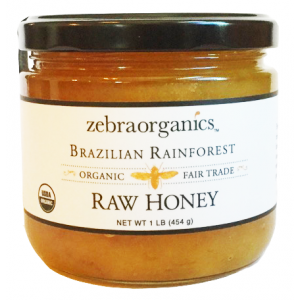
Medicinal Uses of Honey
Honey is a simple sweet treat that can be enjoyed on its own or as a sweetener for cooking and baking. While honey is high in sugars, including fructose, it has a complex composition that includes enzymes, amino acids, proteins, flavonoids and phenolic acids among other components (Ahmed 2018). These compounds give honey potent antioxidant effects and are likely at least part of the reason honey has been used medicinally for thousands of years.
Interest in honey as medicine has been increasing with numerous studies supporting a number of beneficial effects. The medicinal effects of honey appear to include (Ahmed 2018):
- Wound healing properties
- Antimicrobial effects
- Heart Health benefits
- Possible benefits for blood sugar and diabetes
Wound Healing
Honey has long been used topically on wounds to help them heal. Recent research appears to validate its healing potential. In children requiring tooth extraction, honey helped the extraction site to heal faster than placebo (Mokhtari 2019). Another study using honey as a surgical wound dressing found superior benefits with less scarring (Goharshenasan 2016).
Patients with diabetes have poor blood circulation. As a result, they often get ulcers on their feet that are difficult to heal. Honey-based wound dressings were shown to be more effective than standard care with diabetic foot ulcers. Honey treated ulcers healed in 18 days compared to 29 with standard care (Imran 2015).
Antimicrobial Effects
Honey kills many types of bacteria. Using honey as a wound dressing also has the added benefit of treating and preventing infections. In women with severe surgical site infections after giving birth by cesarean, topical honey was compared to alcohol and iodine antiseptic. Honey cleared the bacterial infections and healed the wounds more than twice as fast (Al-Waili 1999).
When patients have kidney failure, they may need dialysis treatment, where a machine filters the blood in place of the kidneys. Due to the need of frequent access to the bloodstream, a semi-permanent tube called a catheter may be installed to provide access. This catheter often becomes infected with life-threatening consequences. Typically, antibiotic ointments are used to prevent infection, however, these encourage the growth of antibiotic resistant bacteria. In a study using honey versus standard antibiotics, honey was just as effective in preventing infection without encouraging resistance (Johnson 2005).
Heart Health Benefits of Honey
Heart disease is the number one killer in the United States. Reducing heart disease is still a major goal of modern medicine. For helping to reduce heart disease, honey might be able to provide some support, although the evidence is preliminary.
A recent study of cardiovascular effects in postmenopausal women showed significant reduction in blood pressure and blood sugar levels after supplementing a tablespoon of Tualang honey daily for a year, although cholesterol levels were unchanged (Wahab 2018). A separate study on healthy young adults showed that just over 3 tablespoons of honey a day was able to significantly improve cholesterol and triglyceride levels (Rasad 2018). Similar cholesterol reducing effects in conjunction with anti-inflammatory benefits were seen in an earlier study from 2008 (Yaghoobi 2008). Notably, none of the studies showed weight gain in people consuming honey.
Blood Sugar and Diabetes
While evidence is mixed, it does suggest that reasonable consumption of honey may be neutral or beneficial for blood sugar control. In a small 12 week study in type 1 diabetic children, modest honey consumption (the equivalent of a tablespoon a day in an adult) decreased blood sugar and improved cholesterol response (Abdulrhuman 2013). In a separate study of type 2 diabetics consuming honey versus sugar, honey only raised blood sugar half as much as pure glucose (Nazir 2014).
To get the benefits of honey, moderation might be key. A separate study on type 2 diabetics using honey showed problematic increases in blood sugar (Bahrami 2009). The study slowly increased honey consumption, having diabetic patients consume up to half a cup of honey per day. While honey may have some benefits, it is still largely composed of sugar. It’s not surprising that if too much is consumed it can still create problems.
To comfortably recommend honey for diabetics, more research is required. If honey is introduced into a diabetic's diet, blood sugar should be monitored carefully to make sure it’s not producing negative effects. I also recommend limiting consumption to one tablespoon of raw honey per day.
Honey Quality
There are numerous types of honey that may vary somewhat in their medicinal effects. It’s also worth noting that there is significant honey fraud, where cheap commercial honey may be nothing more than corn syrup or another cheap sweetener (Economist 2018). Buying local unprocessed honey, or honey from a known supplier is typically recommended to ensure a quality product.
In addition, there are a number of specific types of honey that have been researched for medicinal benefits, including manuka and tualang honey. It’s likely that most unprocessed honeys produce similar medicinal effects for less money. Because of the research, you will typically pay a premium for manuka or tualang products.
Honey is a wonderful sweet treat to enjoy on occasion. It also can be a powerful medicinal tool to keep in your natural medicine cabinet. Enjoying honey in reasonable quantities may provide some significant health benefits.
This article was written by contributing author Dr. Scott Buesing, a naturopathic doctor at The Refinery Integrated Wellness Center in Palm Desert. Dr. Scott's clinical experience includes working with patients with mental health conditions, along with more recent work in pain medicine. Dr. Buesing has positively impacted the lives of many through integrated medicine. For more information about his practice, see buesingnaturopathic.com.


